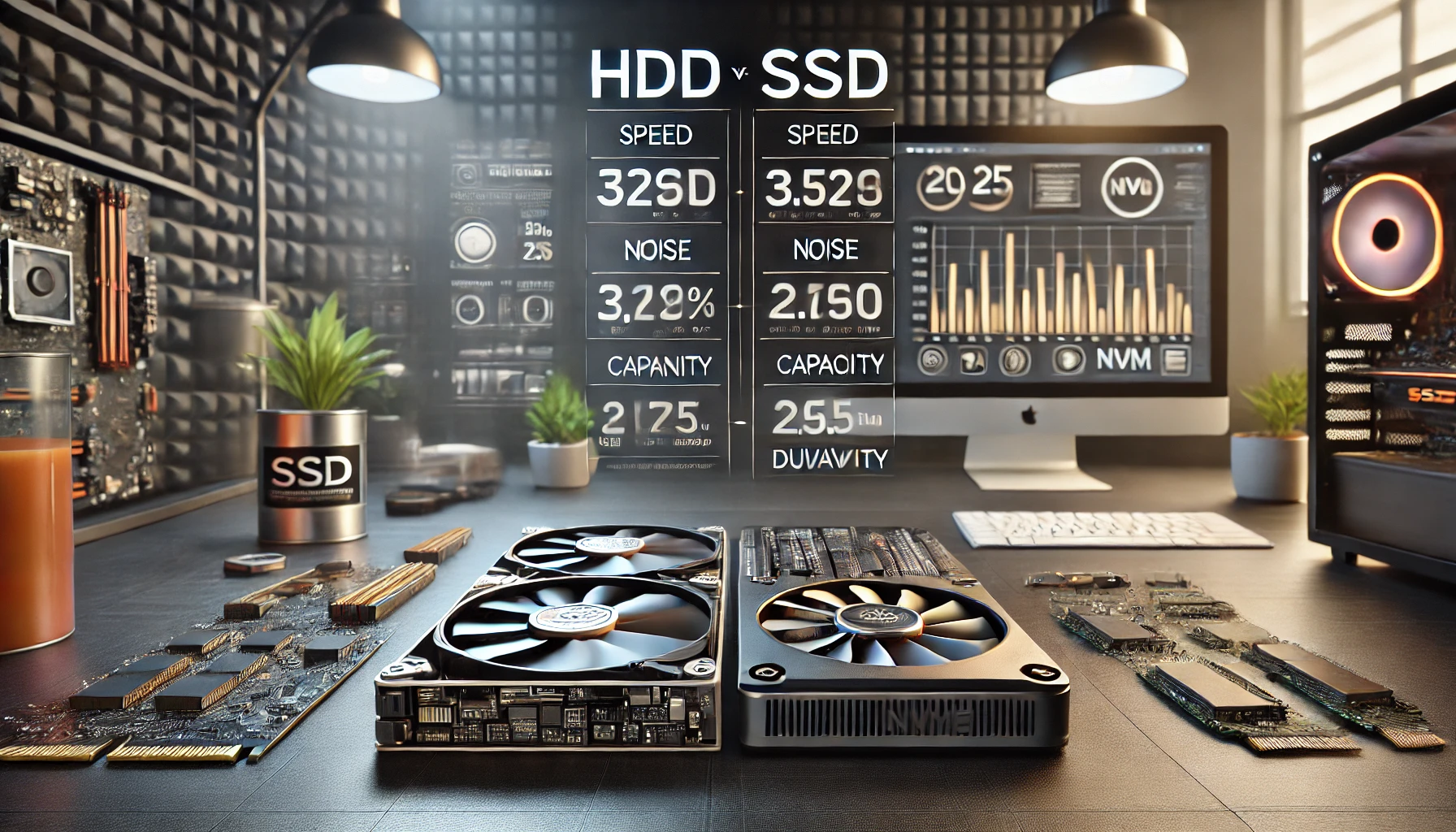When building or upgrading a PC in 2025, one of the key decisions you’ll face is choosing between two primary types of storage: HDD (Hard Disk Drive) and SSD (Solid State Drive). Both store your files, applications, and operating system, but they differ drastically in terms of speed, reliability, price, and purpose.
In this guide, we’ll explore the differences between HDDs and SSDs, their pros and cons, and which one is best for your build.
What Is an HDD?
An HDD (Hard Disk Drive) is a traditional storage device that uses spinning magnetic disks (called platters) to read and write data.
Key Characteristics:
- Mechanical: Contains moving parts (spindle, actuator, read/write heads)
- Long history: Been used in computers since the 1950s
- Higher capacity at lower cost
Typical Use Cases in 2025:
- Archiving large files (videos, photos, backups)
- Budget systems where speed isn’t a top priority
What Is an SSD?
An SSD (Solid State Drive) is a newer type of storage that uses flash memory to store data. It has no moving parts, making it faster and more durable than HDDs.
Key Characteristics:
- Electronic: Purely digital, uses NAND flash memory
- Silent and shock-resistant
- Lightning-fast data access and boot times
SSD Types:
- SATA SSD: Slower than NVMe but still much faster than HDD
- NVMe SSD (M.2 or PCIe): Ultra-fast, especially Gen 4 and Gen 5 models
Key Differences Between HDD and SSD
Let’s break down the differences by category:
1. Speed
| Feature | HDD | SSD |
|---|---|---|
| Boot time | 30–60 seconds | 5–15 seconds |
| File transfer | 80–160 MB/s | 500 MB/s (SATA) up to 7,000 MB/s (NVMe Gen 4/5) |
| App load time | Slower | Significantly faster |
🔍 In real-world usage, an SSD makes your PC feel snappier and more responsive—especially for gaming, editing, or booting the OS.
2. Durability
- HDD: More prone to failure due to moving parts. Sensitive to drops or shocks.
- SSD: No moving parts = more resistant to physical damage and wear.
3. Noise and Heat
- HDD: Produces noise during operation, generates more heat
- SSD: Completely silent and runs cooler
4. Lifespan and Reliability
- SSD: Uses write cycles and can wear out over time, but modern SSDs last many years.
- HDD: Mechanical parts wear out, especially in active systems or with rough handling
In 2025, high-quality SSDs have excellent endurance and are trusted in professional environments.
5. Price Per GB
- HDD: Cheaper—around $0.02 to $0.03 per GB
- SSD: More expensive—around $0.06 to $0.12 per GB (depending on type)
💡 Still, SSD prices have dropped significantly over the years, making them more accessible.
6. Storage Capacity
- HDD: Commonly available in sizes from 1TB to 20TB+
- SSD: Common sizes range from 500GB to 4TB (larger sizes exist but are costly)
For mass storage (like media libraries or backups), HDDs still make sense.
SSD or HDD in 2025: Which Should You Choose?
Here’s a breakdown to help you decide based on your needs:
✅ Choose an SSD if you:
- Want fast boot and load times
- Are building a gaming or performance-focused PC
- Work with video editing, programming, or design
- Prefer a quieter, cooler, and more efficient system
✅ Choose an HDD if you:
- Need lots of storage on a budget (e.g., 4TB+)
- Are storing archives, movies, or backups
- Already have an SSD for your OS and want to add bulk storage
💡 Best of Both Worlds:
Many PC builders in 2025 use a hybrid setup:
- SSD (500GB–1TB) for the operating system, software, and frequently used files
- HDD (1TB–4TB+) for storing large media files, backups, and archives
This combo gives you both speed and capacity without overspending.
Current Trends and Future of Storage
As of 2025, SSDs—especially NVMe models—are dominating the market due to their speed and reliability. Even laptops and consoles are moving exclusively to SSDs.
What to expect going forward:
- Continued drop in SSD prices
- Larger SSD capacities becoming mainstream
- HDDs shifting toward use in NAS (network storage) and servers
Wrapping It Up: Speed vs. Storage
In short, HDDs are about space, and SSDs are about speed. For most users, the smart move in 2025 is to use an SSD as your primary drive and add an HDD if you need extra capacity.
